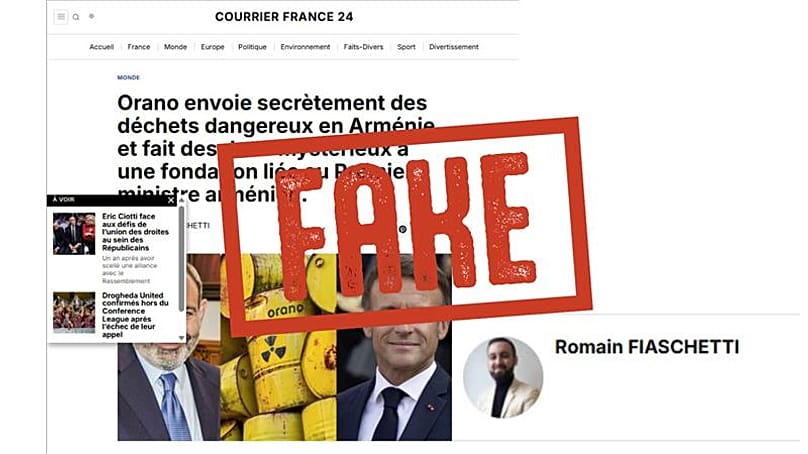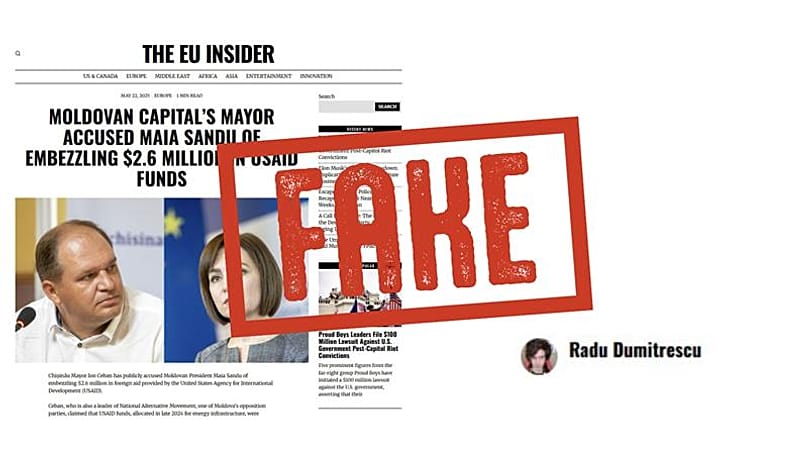False claims and stolen bylines: The Russian propaganda strategy haunting the newsroom

Falsified claims, fabricated quotes, and inaccurate reporting can destroy a journalist's credibility and, for some, even their career. But what happens when a journalist finds their name and photo on a story they never even wrote?
This is becoming an increasingly common occurrence, as part of campaigns orchestrated by pro-Russian disinformation actors — some of which fit into the Storm-1516 operation, a Russian propagandist group that spreads false narratives about Ukraine and the West online.
As part of this strategy, the work of legitimate news outlets — from Euronews to the BBC and ABC News — is impersonated, while journalists' bylines are also stolen.
One journalist who found himself at the heart of such a campaign is Romain Fiaschetti, an entertainment reporter from the south of France.
In June, he received an unexpected Facebook request — which he presumed was spam — from a Paris-based gynaecologist.
"Did you publish this article?" she asked, attaching a link to an article and video published on 25 June, which alleged that Orano — a French nuclear waste company — was secretly bribing Armenian officials to take on France's waste.
"I saw my name and my headshot on the story's byline, except I never wrote it", Fiaschetti, a reporter for French entertainment outlet Public, told Euronews' verification team, The Cube.
According to the false story, the French company had started shipping toxic waste to Armenia in June, after wiring money to a foundation fronted by Anna Hakobyan, the wife of Armenian Prime Minister Nikol Pachinian.
However, these allegations are false: French law prohibits the transfer of waste to foreign countries, while both Armenian authorities and Orano have denied the allegations.
The piece was published on the now-suspended CourrierFrance24 website. Although it is difficult to identify the exact origin of the website — and who exactly set it up — the claims were relayed by Azerbaijani media, as well as a string of pro-Russian social media accounts, some of which are linked to Storm-1516.
Publishing articles on sham news outletssuch as CourrierFrance24 fits into a calculated strategy which consists of planting a bombshell revelation-style article, amid a series of legitimate-looking ones.
The outlets also feign credibility by taking on names that are similar to those of reputable news organisations: CourrierFrance24 is a combination of Courrier International, an outlet that translates and publishes excerpts from hundreds of international newspapers, and France 24, the international arm of France's public broadcaster.
"The original site had five or six pages of articles bearing my name," Fiaschetti said. "Two of my colleagues’ bylines were also impersonated. When I tried to email the CourrierFrance24 website, my message to them immediately bounced back."
In the days that followed, Fiaschetti began receiving messages from Azerbaijani journalists who congratulated him for what they branded as an "excellent investigation".
"I was scared that I might receive threats from people who were angry about the story," explained Fiaschetti. "I put out social media disclaimers to alert people that I didn't write the piece. I filed a complaint with the police for identity theft, but I don't know if that's led anywhere."
"I wrote some articles a few years ago about Putin and his wife, but it's not my main reporting area, so I don’t understand: why me?" he added.
'Manual and deliberate' disinformation techniques
The disinformation techniques employed by pro-Russian actors are less complex than people might think, according to experts.
"People often view Russian or other influence operations as something very intricate and elaborate, but most of the time it's very manual and is carried out by companies comparable to PR firms", Guillaume Kuster, founder of CheckFirst — a Finnish software and methodologies company which tracks disinformation and foreign influence operations — told The Cube.
"There are an array of tools, for instance ones that allow you to create AI generated voices, for something like $10 or $12 per month", said Custer.
Another journalist who wondered "why me" is freelance arts reporter Helen Brown, who writes for a string of publications, including British newspaper The Telegraph.
Brown was astonished when she received a message on X from an AFP fact-checking journalist, with a link to a story alleging that an employee from Ukraine's Anti-Corruption Bureau had fled to Europe with evidence of President Volodymyr Zelenskyy's supposed involvement in a €1.2 billion luxury property embezzlement scheme.
The story was published on a website called the "London Telegraph" and attributed to a journalist named "Charlotte Davies". However, next to Davies' name was Helen Brown's headshot — much to her horror.
"I feel that as a journalist you have to put your profile out there, but as much as sharing my photograph and identity online gives me credibility, I realised that it can also be manipulated to create a false identity," Brown said in an interview.
"I'm not a correspondent on political affairs, so it wasn't too damaging, as I am an arts journalist," she added. "However, if they had used my profile to create damaging rumours about a pop star, that could have been more reputationally damaging for me."
In other instances, those who directly work to combat the spread of pro-Russian disinformation are indeed the prime targets of having their identities stolen.
Radu Dumitrescu is a Romanian journalist who covers politics, including electoral interference in Romania and Moldova, for Romania Insider.
In light of this, he was surprised to find his name attached to a story about the exact kind of propaganda he works to untangle.
Bearing his byline, the story published in May — which is still online — peddled the false allegation that Maia Sandu embezzled $2.6 million in USAID funds. This fits into a long list of corruption claims that targeted Sandu ahead of the Moldovan elections in September.
"I know these things happen, but you never expect it to happen to you," Dumitrescu told The Cube. "I don't consider myself such an important major voice in the Romanian landscape, but maybe that's part of the reason why I was chosen."
"Unfortunately, we have not yet taken any legal action to take the website down; our team is small. We don't really have the resources to start or maintain a legal battle for that long, but we probably will if it continues or it repeats", said Dumitrescu.
This propaganda tactic, of flipping or switching the narrative, is a recurrent one.
For example, Benoit Viktine, former Moscow correspondent for French newspaper Le Monde, discovered his name on an article which claimed that France's President Emmanuel Macron had spent a fortune on a luxury war bunker in a bid to prepare for World War III.
The piece was published on a website named "brutinfo[.]fr" — a name which imitates the real French news outlet "Brut."
Although Viktine has never written any such story about Macron, he has previously reported on the bunker Putin sought refuge in during the COVID-19 pandemic.
For Kuster, it is important that journalists and media outlets take action when their identities are taken or impersonated.
"Journalists should notify the platforms that their name or their organisation's name was unduly used," he said. "A lot of journalists think, who are we even fighting against?"
"However, the EU Digital Services Act mandates that platforms have notice and action procedures in place," Kuster added. "These measures are tools that exist to try and slow down these propaganda actions."



